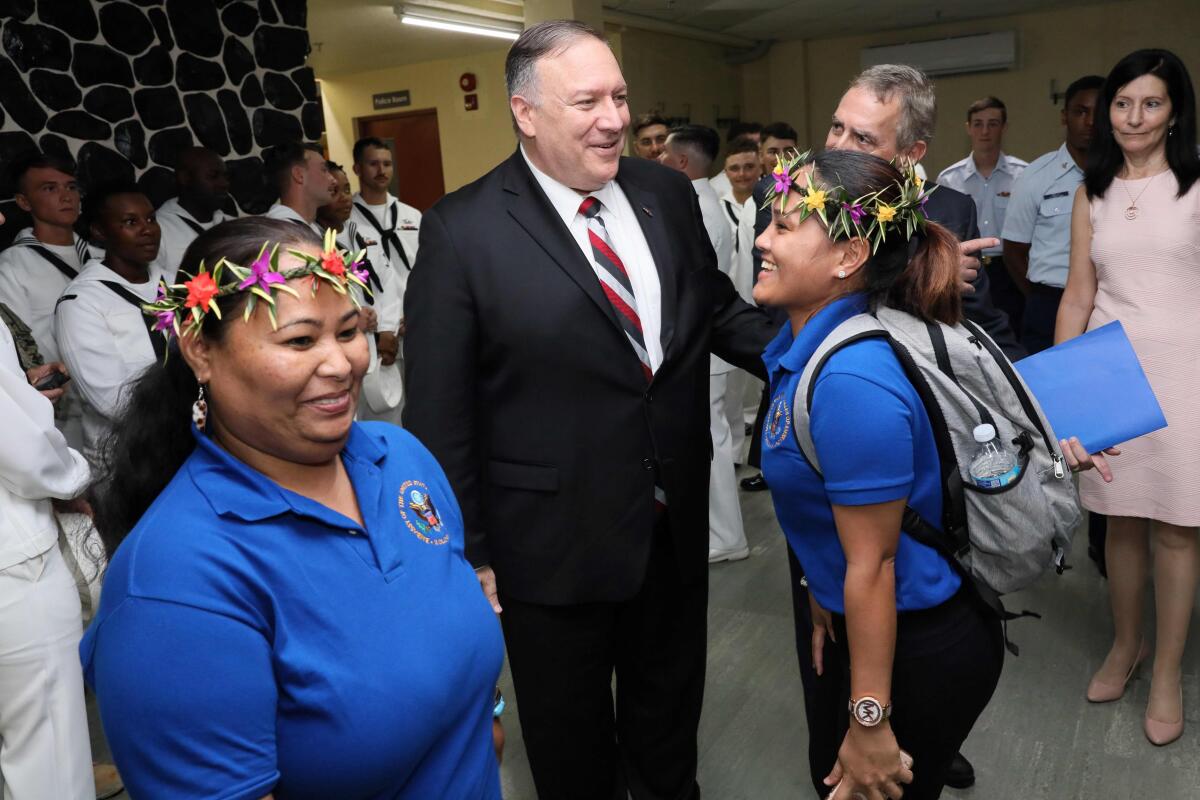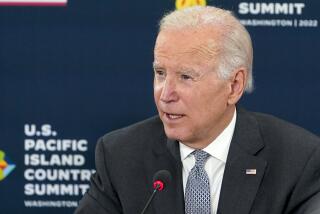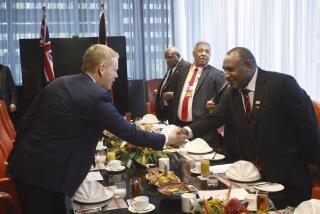Micronesia reaffirms U.S. support while Australia hesitates to join campaign against Iran

PALIKIR, Micronesia — On the last stop Monday of a three-nation tour aimed at reasserting U.S. influence in the Asia-Pacific region, Secretary of State Michael R. Pompeo gained widely expected assurances that the remote, tropical islands of Micronesia would remain on America’s side in the standoff with China.
But Pompeo emerged empty-handed a day earlier in Sydney after seeking Australia’s support in shielding international cargo ships that traverse the crucial Strait of Hormuz from possible Iranian intervention as part of Washington’s escalating conflict with Tehran. Australia hesitated in part out of concern about alienating its other key allies, including China.
On the island of Pohnpei, part of the Federated States of Micronesia, Pompeo urged officials to resist China’s influence as Beijing attempts to “redraw” the Pacific in its “authoritarian image.”
Though it was only for a few hours, Pompeo became the first sitting American secretary of State to visit Micronesia, a grouping of hundreds of islands in the western Pacific.
Pompeo’s trip focused on what the administration is branding the Indo-Pacific, a vast part of the globe the U.S. once dominated but where it has lost ground to Chinese economic and military expansion. He held two days of talks with Southeast Asian leaders in Bangkok and, joined by new U.S. Secretary of Defense Mark Esper, another round with Australia’s government in Sydney.
The complexity of Pompeo’s mission was evident early on. He seemed to pull his punches, publicly at least, in criticizing China during the annual conference of the Assn. of Southeast Asian Nations, or ASEAN, in Bangkok –- where his Chinese counterpart, Wang Yi, was also in attendance. Many of the countries have robust ties with China.
In Sydney, Australian officials said they were giving serious consideration to the U.S. request, but they pointedly said no decision had been made.
That hesitancy reflected Australian concern that an overly close active military relationship with the U.S. could alienate a largely pacifist domestic public and disgruntle allies like China.
It was also another sign of the difficulties the Trump administration is having in marshaling international forces against Iran ever since President Trump walked away from a nuclear-containment agreement with Tehran that continues to be supported by Europe, Russia, China and the United Nations.
France, Germany and Japan have all said they will not dispatch warships to join the U.S. effort in the Strait of Hormuz, a vital waterway for transport of Middle Eastern crude to the West and parts of Asia, and where tensions have soared after a series of explosions on tankers that the U.S. blamed on Iran. The Islamic Republic denied involvement in those attacks, but did claim to have shot down a U.S. drone it said violated its airspace.
Pompeo bristled when a reporter suggested the response to the U.S. request has been lukewarm, cautioning against believing “everything that’s reported in the press.”
“I am very confident that we will have a global coalition that … reduces the risk of conflict in the region and enables the freedom of navigation,” Pompeo said at a brief news conference in Sydney on Sunday. “There’s lots of conversations taking place amongst the nations.”
Standing alongside Pompeo and Esper, Australian Defense Minister Linda Reynolds said the Americans’ “complex” request for Australian participation in escorting ships in the strait would be given “very serious consideration,” but she would not endorse it.
“We are deeply concerned by the heightened tensions in the region. And we strongly condemn the attacks on shipping in the Gulf of Oman,” she said. “But we will ultimately, as we always do, decide what is in our own sovereign interests.”
It was a different story in Micronesia. Here in Pohnpei, Pompeo could not have asked for more effusive support. His criticism of China was the strongest it had been during the entire trip, as were the reassurances he received.
“Your small islands are big strongholds of freedom,” Pompeo said. Referring to China, he added: “We will oppose any larger nation’s attempts to turn the Pacific islands into footholds for regional dominance.”
David Panuelo, president of the Federated States of Micronesia, said, “Our relationship with the United States is first and foremost,” asserting that dealings with China were “purely economic and technical cooperation. I want to make that clear.”
He was echoed by Marshall Islands President Hilda Heine and the vice president of Palau, Raynold Oilouch, who joined the meetings in Palikir. The three tiny nations have a long history with the United States, which administered the islands after World War II until 1986 when they gained independence.
The Compact of Free Association continues to govern the U.S. relationship with the islands, including $100 million in aid annually, water rights conventions and other cooperation. Marshall Islands was the site of a 1967 nuclear test –- one of dozens conducted over the years before -- and radiation continues to plague the Bikini Atoll. One of Pompeo’s activities here was laying a wreath at a memorial for Micronesian citizens killed fighting with U.S. forces in Iraq and Afghanistan.
“U.S. commitment to this region is truly unparalleled,” Pompeo said.
Underscoring the point, the U.S. just this month appointed its first communications officer to its embassy here, and Pompeo announced plans to negotiate parts of the compact that were expiring.
Pompeo, his wife, Susan, who traveled with him, and his entourage were greeted by dozens of “chanters” in traditional dress who danced and sang greetings and bestowed each of the Americans with a mwar mwar, a local version of a floral lei.
His motorcade drove over hilly, narrow roadways lined by thick, lush tropical forest, palm trees, banana plants and thatched roof huts. Mist hung low over parts of the canopy, interrupted for a time by what is described here as daily rain.
Micronesian officials have long complained of degradation from climate change, as rising sea levels erode coastlines, threaten the lifeline industry of fishing, contaminate drinking water with salty ocean water and trigger ever fiercer storms.
Pompeo was less forceful in expressing concern for the climate change that Micronesians say is eating away their coasts. Yet when asked, he did acknowledge the serious problem, something that the administration has been less willing to do.
Trump has described climate change as a hoax, disputed basic science on the role human activity contributes and withdrew the United States from the landmark Paris climate accord, making the United States one of only a handful of countries who are not participating.
More to Read
Sign up for Essential California
The most important California stories and recommendations in your inbox every morning.
You may occasionally receive promotional content from the Los Angeles Times.











